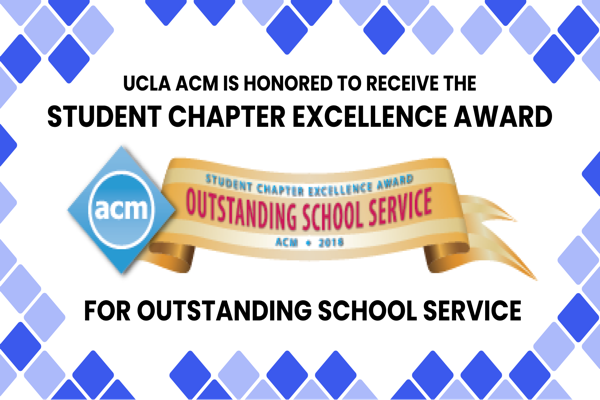This year, both UCLA ACM, the largest computer science community at UCLA, and UCLA UPE, a chapter of Upsilon Pi Epsilon, the international honor society for the computing and information disciplines, were recognized for their outstanding achievements as student chapters of their respective organizations. Specifically, ACM received the 2017-2018 Student Chapter Excellence Award for Outstanding School Service, while UPE earned the Best Large Chapter Award. These awards mark the second year in a row that both UPE and ACM have been internationally recognized out of hundreds of other student chapters for their hard work and dedication towards furthering opportunities for students interested in computer science and its applications.
“It’s exciting and encouraging to win for the second year in a row, just because it affirms not only our consistency [in helping the CS community], but also the growth we’ve accomplished this year, and the improvements we’ve made,” said Cristen Anderson, president of UPE.
“I’m proud of our accomplishments [as a club] as well,” added Mihir Mathur, president of UCLA ACM. “I feel really happy that our board was able to maintain the prestige we achieved in previous years, as well as help the club grow.”
Richard Korf, the undergraduate vice chair for the department, agreed that the accomplishments of both organizations were no small feat. “I’m absolutely thrilled that both UCLA ACM and UPE have won their respective national best-chapter awards from their parent organizations for the 2nd year in a row. This is absolutely unprecedented,” Korf said. “These organizations represent a vital and unique resource to all of our students, creating a real sense of community with all the activities they sponsor, and enhancing our students’ education with the additional courses that they teach, supplementing our formal curriculum.”
“ACM and UPE fully deserve these honors; our students work very hard and have achieved this prestigious recognition because they are truly visionaries,” added Andrea Lanter, the CS undergraduate student affairs officer. “The students that participate in these chapters are forward-thinking, creative, collaborative, and incredibly resourceful and intelligent. It has been my pleasure to support them as they give back to the CS community, look to involve their peers, and innovate wherever possible. This is always on top of the academic work that they do first and foremost as students, which is another great testament to their incredible abilities. Their work is energizing and inspiring, and I am so happy for them!”
Both UPE and ACM have gone to great lengths in order to offer an incredible amount of resources to the computer science community. This year, UPE not only introduced tutoring for upper-division computer science courses in addition to their regularly scheduled quarter-long tutoring in STEM courses, but they also formed an entrepreneurship team which works with other organizations to put on events such as tech talks, workshops, and panels that help expose students to the realm of startups. UPE also partnered with ACM to put on Founder’s School, Southern California’s largest student-led entrepreneurship conference which connects founders to aspiring student entrepreneurs.
ACM has been focusing on offering resources to help students further develop their CS skills, both inside and outside the classroom. In addition to their regular quarter-long training programs such as Hack School, an 8-week program which teaches beginner web development, and various workshops in game development, machine learning, and more, ACM has also been working towards advocating change within the computer science curriculum. “UCLA ACM is the voice through which students communicate concerns and suggestions to the UCLA CS department,” one of ACM’s reports reads. “We release surveys, summarize the results and present them at board meetings with UCLA CS department staff and professors to suggest changes for the curriculum as well as for diversity and inclusion efforts. One huge change that was made recently in order to combat the low retention rates of introductory CS classes was to [involve the CS department in] the ‘Learning Assistants’ program, [which] lets students teach their peers…[this program] has helped freshmen students new to CS at UCLA avoid imposter syndrome when thrown into an introductory class with more advanced students who have prior exposure.”
Of course, both Anderson and Mathur agreed that the club’s success could not have been possible without the help of computer science staff and faculty. “We’d like to thank the department, as well as UCLA Engineering, for supporting us and giving us the resources needed for success,” Mathur said.
Both Anderson and Mathur will be passing on the roles of presidents of their respective organizations, with Yvonne Chen having been elected president of ACM and Nathan Zhang president of UPE. In the future, both clubs hope to continue to help foster a relationship between the department and students, and encourage collaboration between the two groups.
“There’s a lot of faculty who aren’t aware of what these student organizations are doing [in the computer science community], and vice versa – [a lot of students] aren’t really aware of the sorts of research professors are doing,” Anderson said. “One thing I hope to see in the future is a [closer relationship] between faculty and students.”
Read more about ACM and their activities here, and more about UPE and the resources they offer here.



